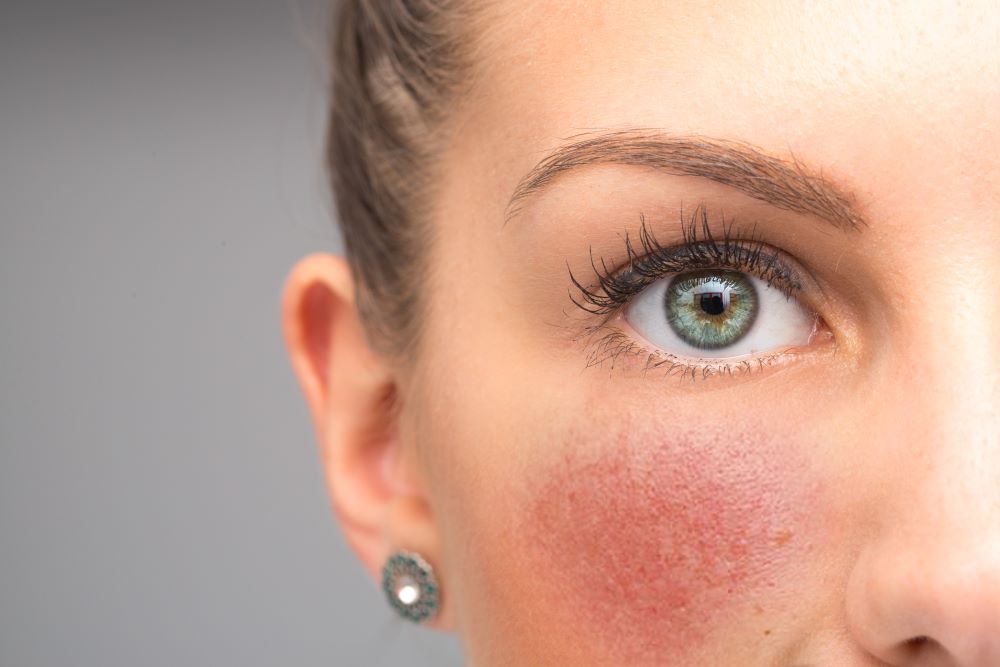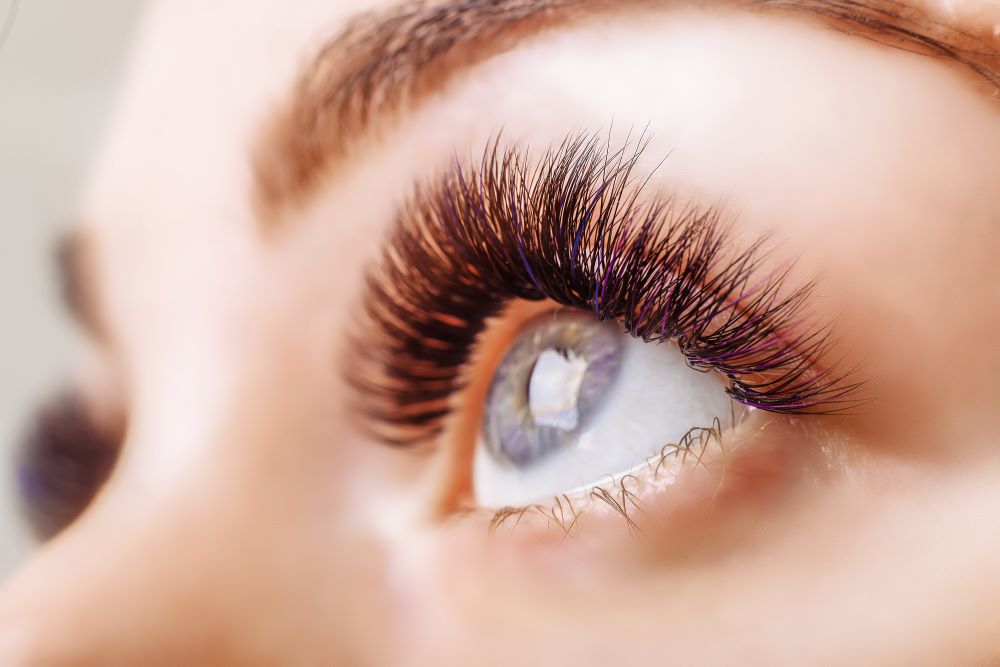Was ist eigentlich ein Pickel?
Pusteln, oft auch als "Pickel" oder "Eiterpickel" bezeichnet, sind eine Form von Akne, die die Poren betrifft. Sie sind neben Mitessern und fettiger Haut eines der häufigsten Symptome der gewöhnlichen Akne. Sie entwickeln sich in der Regel bei mittelschwerer Akne, können aber auch bei leichteren Fällen auftreten. Die rötlichen Erhebungen auf der Haut sind häufig von einer weißen Pustel bedeckt oder liegen in Form von unterirdischen Pickeln ganz unter der Haut.
Dabei spielt es keine Rolle, ob es sich um Pickel oder Mitesser handelt: Wir raten Ihnen dringend davon ab, Pickel (oder Mitesser) zu quetschen. Offene Pickel können mit weiteren Keimen in Berührung kommen, was die Sache nur noch verschlimmert. Unterirdische Pickel führen dazu, dass sich Talg (Hautfett) ansammelt und in die umliegenden Hautbereiche ausbreitet, was zu bestehenden Entzündungen führen kann. In sehr seltenen Fällen kann sich eine Meningitis entwickeln.
Welche Arten von Pickel gibt es?
Lassen Sie uns jede Verwirrung vermeiden, indem wir systematisch die verschiedenen Arten von Pickeln untersuchen. Sicherlich haben Sie schon bemerkt, dass diese Hautunreinheiten sehr unterschiedlich aussehen können. Einige können mit Eiter gefüllt sein und eine gelbliche Farbe haben, während andere schwärzlich aussehen können. Sie können erhaben sein oder wie ein rauer Knoten in der Haut sitzen.
Als erstes sollten Sie prüfen, ob es sich bei Ihren Hautunreinheiten um entzündliche Akne handelt oder nicht. Entzündliche Akne, auch als schmerzhafte Akne bekannt, ist durch schmerzhafte Pickel gekennzeichnet, die oft gerötet sind. Nicht-entzündliche Akne umfasst diese Art von Unreinheiten (Komedonen). Wenn sich Mitesser bilden, kann die Öffnung unserer Talgdrüsen verstopft sein. Dies kann durch eine erhöhte Talgproduktion oder übermäßige Verhornung verursacht werden. Ein Pfropfen entsteht auf der Hautoberfläche als Folge einer Verstopfung der Talgdrüsen durch abgestorbene Hautzellen und Talg. Mitesser sind schwarz (Blackhead) oder weiß/hell gefärbt (Whiteheads). Was ist der Unterschied zwischen einem Whitehead und einem Blackhead?
- Blackheads: Der Talgpfropf, der eine Verbindung zwischen dem Haarfollikel und der Hautoberfläche darstellt, kann oxidiert werden, wenn er mit Luftsauerstoff in Berührung kommt. Das Melaninpigment in diesen Zellen verdunkelt sich durch diese Reaktion, wodurch ein Mitesser entsteht.
- Whitehead: In Wirklichkeit besteht der Unterschied darin, dass hier kein Kontakt mit Luftsauerstoff besteht und die oberste Hautschicht den Pfropfen wie eine dünne Membran bedeckt. Der Inhalt des Stopfens ist hell.
Die andere Art von Hautunreinheiten sind die Pickel, die sich entzündlich zeigen. Dies wird als entzündliche Akne bezeichnet. Die Symptome der Haut können zunehmend quälend werden. Während Sie Ihrer Haut einen Mitesser vielleicht noch verzeihen, kann entzündliche Akne schwere Beschwerden, rote Beulen, mit Eiter gefüllte Pickel und Knötchen tief in der Epidermis verursachen.
Dabei handelt es sich um Furunkel, Papeln, Knötchen, Zysten und andere Hautunreinheiten, die im Fachjargon vielleicht schwer zu fassen sind. Eine Pustel ist vergleichbar mit einem Pickel, da es sich um eine winzige rote entzündete Stelle handelt, aus der Eiter austritt, wenn man sie zusammendrückt. Sie ähneln einer weißen Pustel und schmerzen bei Berührung.
Ein geröteter und geschwollener Klumpen kann auf der Haut als Pickel zu sehen sein. Man kann jedoch spüren, dass sie tief in die Haut eindringen, wenn man sie zusammendrückt. Viele Menschen bezeichnen sie aufgrund dieser Fähigkeit als "unterirdische Pickel". Da sich diese Art von Pustel in einer tieferen Schicht entwickelt als z.B. eine Pustel, kann eine Überwucherung von Propionibakterien (Bakterien auf der Haut) eine wichtige Rolle spielen.
Wie entstehen Pickel?
Wenn sich Pickel bilden, liegt das oft an den Hormonen. Ein Überschuss an männlichen Sexualhormonen (Androgenen) im Körper bringt das Verhältnis zwischen männlichen und weiblichen Sexualhormonen aus dem Gleichgewicht. Dies führt dann dazu, dass die Talgproduktion (Hautfett) angeregt wird, was zur Bildung von Pickeln führt. Wenn die Haut stärker verhornt, führt dies zu einem Talgstau. Von hier aus bilden sich Mitesser und wenn sie mit Bakterien in Berührung kommen, entstehen aufgrund von Entzündungen Pickel.
Weitere Ursachen für unreine Haut im Gesicht
Hormonelle Veränderung
Hormonelle Veränderungen können durch eine Vielzahl von Faktoren verursacht werden, z.B. durch ein neues Verhütungsmittel, eine Schwangerschaft, Stress oder das Altern. Dabei kann es sich um eine langfristige oder kurzfristige Reaktion handeln, wie die Menstruation oder das Absetzen der Pille. Der Glaube, dass hormonell bedingte Akne nur während der Pubertät auftritt, ist daher irrsinnig.
Medikamente
Risiken und Nebenwirkungen können sich auch auf die Haut auswirken. Eine Reihe von Medikamenten, wie Anabolika, Psychopharmaka oder Neuroleptika, können eine bestehende Akne verschlimmern oder sogar hervorrufen.
Veranlagung und Gene
Haben Sie sich jemals gefragt, warum manche Menschen Akne haben? Werfen wir einen Blick darauf, was wir von unseren Eltern geerbt haben. Stimmt es, dass dunkles Haar, blaue Augen, unreine Haut ein Erbgut sind, das über Generationen weitergegeben wird? Wenn ein oder beide Elternteile Akne hatten, liegt somit eine genetische Veranlagung für Akne vor.
Ernährung
"Du bist, was du isst" - unsere Nahrung kann sich auch auf die Haut auswirken. Die Haut kann auf Mahlzeiten unterschiedlich reagieren, genau wie bei Allergien. Alkohol, Zucker und Weißmehlprodukte sind zwei häufige Übeltäter, die bei Menschen Entzündungsreaktionen hervorrufen. Milchprodukte, Eier und Schweinefleisch gelten als entzündungsfördernd. Eine gesunde Ernährung, die möglichst viele unverarbeitete Lebensmittel enthält, ist empfehlenswert.
Falsche Hautpflege
Da jeder Mensch einen anderen Hauttyp hat, benötigt jeder Mensch eine spezielle Pflege für seine Haut. Um herauszufinden, welche Art von Routine man befolgen sollte, konsultieren Sie am besten einen Dermatologen oder eine Kosmetikerin, die sich ein genaues Bild von Ihrem Zustand machen können. Es gibt jedoch eine goldene Regel, die eine gute Hautpflege von einer schlechten unterscheidet: Berühren Sie Ihr Gesicht nicht! Denn wenn wir unser Gesicht zu oft berühren, laufen wir Gefahr, Bakterien und Keime einzuladen, die dann zu Entzündungen und Hautunreinheiten führen.
Umwelteinflüsse
Die Luftqualität ist in überfüllten Städten wesentlich schlechter als in ländlichen Gebieten, und das wirkt sich auf unsere Haut aus. Auspuffgase, Smog und Feinstaub sind ungesund für die Haut! Saubere Luft, wie Sie sie in Wäldern oder in den Bergen vorfinden, ist dagegen hervorragend für die Haut.
Lebensstil
Ist es ein Zufall, dass Pickel und Unreinheiten gerade nach dem Partywochenende auftreten? Das ist keine Überraschung: Alkohol trocknet die Haut aus und erhöht gleichzeitig die Talgabsonderung. Eine negative Mischung, die zu Pickeln führen kann. Auch Rauchen schädigt die Haut. Schadstoffe stören Entzündungsprozesse und verengen die Blutgefäße, so dass Ihre Haut nicht mehr atmen kann. Stress ist ein weiterer Faktor, der das Erscheinungsbild unreiner Haut verschlechtert: Ob zu Hause oder bei der Arbeit, Hektik kann einen schlechten Teint fördern.
Was tun gegen Pickel?
Es gibt keine Einheitslösung für perfekte Haut, aber Sie können Ihr Bestes tun, um auf die Bedürfnisse Ihrer Haut einzugehen. Wenn Sie sich nicht sicher sind, was genau Ihrer Haut fehlt, ist es immer eine gute Idee, einen Experten zu fragen. Die falsche Art der Pflege kann Pickel, Mitesser und Akne sogar noch verschlimmern. Betrachten Sie die oben aufgeführten möglichen Ursachen für unreine Haut und überlegen Sie, welche davon zutreffen könnten und ob Sie etwas dagegen tun können. Die Haut wird sowohl durch innere als auch durch äußere Faktoren beeinflusst, aber nicht alle davon liegen unter unserer Kontrolle. Wenn wir eine bessere Haut haben möchten, brauchen wir Geduld. Veränderungen geschehen nicht über Nacht, und oft ist das Erscheinungsbild unserer Haut aufgrund von Dingen wie Stress oder Hormonschwankungen nur vorübergehend. Wir sollten immer daran denken, dass unsere Haut ein Spiegelbild von uns selbst ist. Anstatt uns selbst dafür zu bestrafen, dass wir keine perfekte Haut haben, sollten wir freundlich zu uns selbst sein und glauben, dass wir es wert sind, egal wie unser Teint aussieht.
Hausmittel gegen Pickel
Machen Sie sich keine Sorgen, wenn ein Pickel auftaucht. In solchen Situationen brauchen Sie kein Wundermittel aus dem Laden. Eines von mehreren Hausmitteln kann auch gegen Pickel helfen.
Teebaumöl
Teebaumöl wird aufgrund seiner antibakteriellen und entzündungshemmenden Eigenschaften zur Behandlung von Pickeln eingesetzt. Dank dieser Eigenschaften trocknet die entzündete Pustel schnell ab. Dadurch werden Sie nicht nur die unansehnliche Rötung los, sondern der entzündete Pickel wird auch kleiner und ist weniger schmerzhaft. Bitte beachten Sie, dass Sie bei ungewöhnlich empfindlicher oder trockener Haut Ihre Haut nach etwa 15 Minuten mit lauwarmem Wasser waschen sollten, um das Teebaumöl zu entfernen.
Apfelessig Gesichtswasser
Viele von Ihnen kennen dieses wenig bekannte Geheimnis vielleicht nicht: Gewöhnlicher Apfelessig enthält ebenso wie Teebaumöl antibakterielle und entzündungshemmende Stoffe, die Ihre Poren reinigen und zukünftige Verunreinigungen verhindern können. Die Apfelessiglösung gleicht den pH-Wert Ihrer Haut aus. Der Geruch von Apfelessig mag zunächst unangenehm sein, aber er verfliegt schnell nach der Anwendung.
Honig-Zimt Maske
Honig kann nicht nur das eine oder andere Gesichtspflegeprodukt ersetzen, sondern er hilft auch besonders, wenn Sie empfindliche Haut haben. Der süße Aufstrich verhindert die Ausbreitung von Bakterien und beschleunigt den Heilungsprozess von Pickeln. Wenn Sie Honig als intensive Maske mit Zimt verwenden, werden Sie deutliche Ergebnisse feststellen.
Zitrone
Ein einzelner Pickel blüht in Ihrem Gesicht? In diesem Fall kann die Zitrone Abhilfe schaffen. Ihre antibakterielle Wirkung hilft, das Wachstum des Pickels schnell zu stoppen. Andererseits sorgt die Anwendung dieses Hausmittels auch dafür, dass der Pickel schneller austrocknet und somit schneller verschwindet. Ein wichtiger Hinweis: Zitronensaftkonzentrat enthält Konservierungsstoffe - verwenden Sie für diesen SOS-Trick also immer frischen Zitronensaft!
Heilerde
Eine Heilerdemaske ist auch eine wirksame Hausbehandlung für Pickel und Mitesser. Sie enthält Elemente und Mineralien, die eine hautheilende Wirkung haben. Heilerde als Maske hat eine kühlende Wirkung, löst verstopfte Poren und entfernt Schuppen und überschüssiges Fett von der Haut. Großartig: Die Heilerde-Maske kann auf jede Körperpartie aufgetragen werden - vom Gesicht über das Dekolleté bis zum Rücken - und ist damit äußerst vielseitig.
Aloe Vera
Das in den Blättern der Aloe Vera enthaltene Gel kann helfen, Pickel zu lindern, Reizungen zu beruhigen und den Heilungsprozess zu beschleunigen. Wussten Sie, dass es auch zur Linderung von Aknenarben beitragen kann?
Kamille
Für viele von uns wecken Dampfbäder mit Kamille Erinnerungen an unsere Kindheit, als unsere Eltern sie uns als Hausmittel gegen Erkältungen verabreichten. Aber wussten Sie, dass sie auch den angenehmen Nebeneffekt haben, dass sie unsere Poren öffnen und Make-up-Rückstände und Schmutz abfließen lassen? Ein Dampfbad ist daher auch ein bekanntes Hausmittel gegen Pickelalarm. Kamille trägt zur Wirksamkeit eines Dampfbads gegen Pickel bei. Ihre antiseptischen Eigenschaften tragen dazu bei, dass die Pusteln schneller abklingen.
Fazit
Hautpflege ist ein sehr persönliches Thema. Nur Sie können entscheiden, ob die gegebenen Empfehlungen für Sie von Nutzen sind. Wenn Ihre Haut extrem empfindlich ist und zu Irritationen führt, sollten Sie einen Dermatologen aufsuchen. So können Sie sicher sein, dass Sie die Behandlung erhalten, die am besten zu Ihrem Hauttyp passt.



